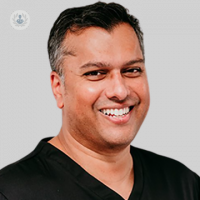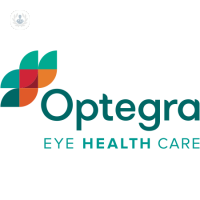What is the cornea?
The cornea is the protective transparent membrane covering the front part of the eye, namely the pupil and the iris. It is about 0.5 mm thick and it is made of five layers: corneal epithelium, Bowman's layer, corneal stroma, Descemet’s membrane and corneal endothelium. The cornea is kept moist with a thin layer of tears (tear film) right on top of it.
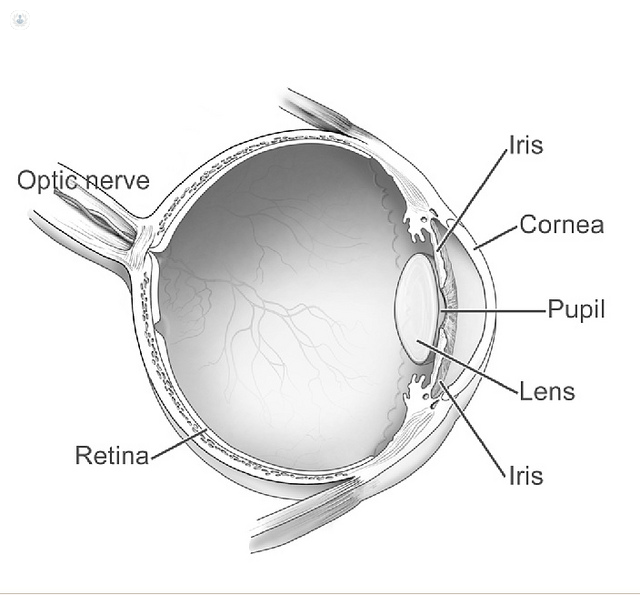
What is the cornea for?
Besides protecting the inner part of the eye from injuries and pathogens, the cornea reflects light when it passes through towards the inner structures of the eye.
What conditions can affect the cornea?
Several corneal conditions are linked to genetic factors and to family history. If someone in your family has suffered from a corneal condition, you should go for an eye examination for early detection of any potential eye disorders.
The most common injuries and conditions of the cornea are:
- Keratitis (inflammation of the cornea)
- Fuchs' corneal endothelial dystrophy (FCED)
- Corneal dystrophies
- Corneal ulcer
- Keratoconus
- Corneal abrasion (scratched cornea) – this can cause a loss of the surface epithelial layer of the cornea, and thus, a loss of transparency
- Herpes
- Shingles

How can corneal conditions be treated?
With early detection it is possible to treat corneal conditions, which will avoid the risk of having to do surgery. If some corneal diseases and dystrophies are not caught early enough, the best option could be a corneal transplant. By substituting the diseased cornea with a new one, the eyes can be restored to normal.
Which doctor should I see?
You should see a specialised ophthalmologist.
05-12-2017 09-22-2023Cornea
Mr Radwan Almousa - Ophthalmology
Created on: 05-12-2017
Updated on: 09-22-2023
Edited by: Carlota Pano
What is the cornea?
The cornea is the protective transparent membrane covering the front part of the eye, namely the pupil and the iris. It is about 0.5 mm thick and it is made of five layers: corneal epithelium, Bowman's layer, corneal stroma, Descemet’s membrane and corneal endothelium. The cornea is kept moist with a thin layer of tears (tear film) right on top of it.

What is the cornea for?
Besides protecting the inner part of the eye from injuries and pathogens, the cornea reflects light when it passes through towards the inner structures of the eye.
What conditions can affect the cornea?
Several corneal conditions are linked to genetic factors and to family history. If someone in your family has suffered from a corneal condition, you should go for an eye examination for early detection of any potential eye disorders.
The most common injuries and conditions of the cornea are:
- Keratitis (inflammation of the cornea)
- Fuchs' corneal endothelial dystrophy (FCED)
- Corneal dystrophies
- Corneal ulcer
- Keratoconus
- Corneal abrasion (scratched cornea) – this can cause a loss of the surface epithelial layer of the cornea, and thus, a loss of transparency
- Herpes
- Shingles

How can corneal conditions be treated?
With early detection it is possible to treat corneal conditions, which will avoid the risk of having to do surgery. If some corneal diseases and dystrophies are not caught early enough, the best option could be a corneal transplant. By substituting the diseased cornea with a new one, the eyes can be restored to normal.
Which doctor should I see?
You should see a specialised ophthalmologist.
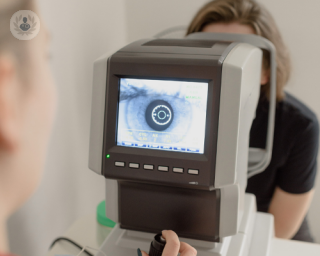

Cornea guttata: What is it and when do their presence indicate eye problems?
By Mr Geraint Williams
2024-12-14
Cornea guttae can potentially lead to significant vision issues such as a significant reduction in vision. Here to provide a detailed and expert explanation about the nature of why they come together to form one mass – and more about the condition, including symptoms - is leading consultant ophthalmologist in Worcester, Hereford and Droitwich Mr Geraint Williams. See more


How much do you know about Keratoconus?
By Mr Vincenzo Maurino
2024-12-14
We're raising awareness for World Keratoconus Day! Expert Vincenzo Maurino explains the keratoconus signs to watch out for, and how KC can be treated. See more
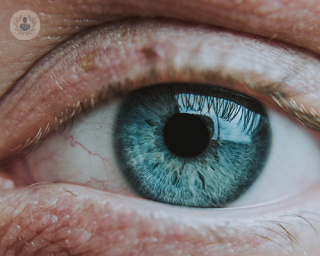

How successful is DMEK eye surgery?
By Mr Maninder Bhogal
2024-12-14
DMEK (descemet membrane endothelial keratoplasty) is a state-of-the-art partial-thickness corneal transplant procedure that replaces only the eye’s damaged Descemet membrane and endothelium (the inner lining of the cornea). Here, Mr Maninder Bhogal, renowned consultant ophthalmologist based in London, provides an expert insight into DMEK eye surgery. See more
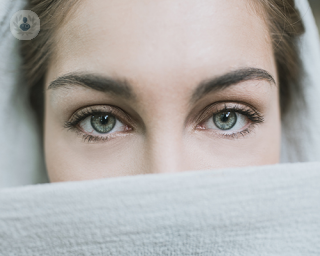

Corneal ulcers: what are they and are they dangerous?
By Professor Parwez Hossain
2024-12-14
Corneal ulcers are painful sores that develop on the cornea (the transparent layer on the front of the eye that covers the pupil, iris and anterior chamber). Professor Parwez Hossain, a leading ophthalmologist, details what this eye condition is and why it is important to be aware of. Whilst corneal ulcers are dangerous to our vision, they are not all that uncommon either. See more
Experts in Cornea
-
Mr Rakesh Jayaswal
OphthalmologyExpert in:
- Cornea
- Cataracts
- Laser eye surgery
- Lens replacement (intraocular lenses)
- ICL implants
- Corneal diseases
-
Mr Radwan Almousa
OphthalmologyExpert in:
- SMILE laser eye surgery
- Dry eye
- Refractive surgery
- Cornea
- Oculoplastics
- Cataracts
-
Mr Michael Tappin
OphthalmologyExpert in:
- Cornea
- Cataracts
- Laser eye surgery
- Lens replacement (intraocular lenses)
- Corneal diseases
- Presbyopia
-
Professor Sai Kolli
OphthalmologyExpert in:
- Cataract surgery
- Lens replacement (intraocular lenses)
- Cornea
- Dry eye
- Laser eye surgery
- Low vision
-
Mr Paul Tomlins
OphthalmologyExpert in:
- Cataracts
- Dry eye
- Keratoconus
- Corneal transplant
- Corneal diseases
- Cornea
- See all

The Wellington Hospital - part of HCA Healthcare
The Wellington Hospital - part of HCA Healthcare
Wellington Hospital South Bldg, 8A Wellington Pl, NW8 9LE
No existe teléfono en el centro.
By using the telephone number provided by TOP DOCTORS, you automatically agree to let us use your phone number for statistical and commercial purposes. For further information, read our Privacy Policy
Top Doctors

Mount Alvernia Hospital - part of Circle Health Group
Mount Alvernia Hospital - part of Circle Health Group
Harvey Road, Guildford GU1 3LX
No existe teléfono en el centro.
By using the telephone number provided by TOP DOCTORS, you automatically agree to let us use your phone number for statistical and commercial purposes. For further information, read our Privacy Policy
Top Doctors

Optegra Manchester Eye Hospital
Optegra Manchester Eye Hospital
Optegra Eye Hospital, Manchester One Didsbury Point, 2 The Avenue, Didsbury, Manchester
No existe teléfono en el centro.
By using the telephone number provided by TOP DOCTORS, you automatically agree to let us use your phone number for statistical and commercial purposes. For further information, read our Privacy Policy
Top Doctors
-
The Wellington Hospital - part of HCA Healthcare
Wellington Hospital South Bldg, 8A Wellington Pl, NW8 9LE, Central LondonExpert in:
- Digestive
- Cardiology
- Orthopaedic surgery
- Orthopaedic spinal surgery
- Intensive care
- Spine
-
Mount Alvernia Hospital - part of Circle Health Group
Harvey Road, Guildford GU1 3LX, GuildfordExpert in:
- Hip
- Cancer
- Cardiology
- General Surgery
- Orthopaedic surgery
- Orthopaedic spinal surgery
-
Optegra Manchester Eye Hospital
Optegra Eye Hospital, Manchester One Didsbury Point, 2 The Avenue, Didsbury, Manchester , ManchesterExpert in:
- Cataracts
- Eyelid surgery
- Laser eye surgery
- ICL lens implants
- Corneal transplant
- See all
- Most viewed diseases, medical tests, and treatments
- Visual impairment
- Diabetic retinopathy
- Retina
- Presbyopia
- Nystagmus
- Myopia
- Hyperopia (farsightedness)
- Eye examination
- Blepharitis
- Astigmatism

